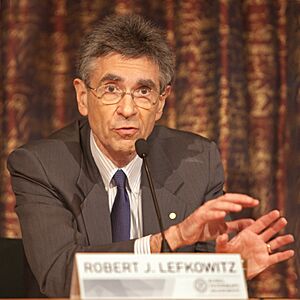Robert Lefkowitz facts for kids
Quick facts for kids
Robert Lefkowitz
|
|
|---|---|

Lefkowitz in Stockholm 2012
|
|
| Born |
Robert Joseph Lefkowitz
April 15, 1943 The Bronx, New York City, US
|
| Nationality | American |
| Alma mater | Columbia University |
| Known for | G protein coupled receptors beta-arrestins |
| Spouse(s) | Arna Brandel (divorced) Lynn Tilley
(m. 1991) |
| Awards | National Medal of Science (2007) BBVA Foundation Frontiers of Knowledge Award (2009) Nobel Prize in Chemistry (2012) |
| Scientific career | |
| Fields |
|
| Institutions | |
| Notable students | Brian Kobilka, Jeffrey Benovic, Michel Bouvier, Marc G. Caron, Richard A. Cerione, Henrik Dohlman, Walter J. Koch, Lee Limbird, Martin J. Lohse, Gang Pei, Lewis "Rusty" Williams, R. Sanders Williams |
Robert Joseph Lefkowitz, born on April 15, 1943, is an American doctor and scientist. He is famous for discovering how important tiny "receivers" in our bodies work. These discoveries earned him the Nobel Prize in Chemistry in 2012, which he shared with Brian Kobilka. He works as a researcher at the Howard Hughes Medical Institute and is a professor at Duke University.
Contents
Early Life and Education
Robert Lefkowitz was born in The Bronx, New York, on April 15, 1943. His parents, Max and Rose, came from Poland in the late 1800s.
He went to the Bronx High School of Science. After that, he studied chemistry at Columbia College. He earned his bachelor's degree in 1962.
In 1966, he graduated from Columbia University College of Physicians and Surgeons with a medical degree. He then worked at the National Institutes of Health from 1968 to 1970.
His Amazing Discoveries
In 1973, Dr. Lefkowitz started working at Duke University Medical Center. He became a professor there in 1977. Since 1976, he has also been a researcher at the Howard Hughes Medical Institute.
How Our Bodies Receive Signals
Dr. Lefkowitz studies how our bodies receive signals. Think of your body as having tiny "locks" on the outside of its cells. These locks are called receptors. When a "key" (like a hormone or a medicine) fits into a lock, it sends a message inside the cell.
He is best known for studying a very important group of these locks called G protein-coupled receptors, or GPCRs. He also discovered two families of proteins that control these locks.
The "Key and Lock" System
In the mid-1980s, Dr. Lefkowitz and his team made a huge breakthrough. They found the genetic code for a specific receptor. Then, they found the codes for seven more similar receptors. These receptors respond to adrenaline, which is a hormone that makes your heart race.
This led to an amazing discovery: all GPCRs have a very similar shape. They are like tiny threads that weave in and out of the cell's outer layer seven times. Today, we know that about 1,000 different receptors in the human body belong to this same family.
Why This Discovery Matters
Because all these receptors are so similar, scientists now understand how they work. This helps them create new medicines. Many common prescription drugs today are designed to fit into these "locks."
For example, medicines for allergies, stomach ulcers, and high blood pressure all work by targeting these receptors. Dr. Lefkowitz's work has helped millions of people around the world.
Personal Life
Dr. Lefkowitz is married to Lynn Tilley. He has five children and six grandchildren. He was previously married to Arna Brandel.
In 2021, he wrote a book about his life called A Funny Thing Happened on the Way to Stockholm: The Adrenaline-Fueled Adventures of an Accidental Scientist. The book talks about his early life, how he became a doctor, and his journey into scientific research. It also shares stories about his research career and winning the Nobel Prize.
Awards and Honors
Dr. Lefkowitz has received many important awards for his work, including:
- 2014 Golden Plate Award of the American Academy of Achievement
- 2012 Nobel Prize in Chemistry (shared with Brian Kobilka)
- 2009 BBVA Foundation Frontiers of Knowledge Award
- 2007 National Medal of Science
- 2007 The Shaw Prize in Life Science and Medicine
- 2007 Albany Medical Center Prize in Medicine and Biomedical Research
See also
 In Spanish: Robert Lefkowitz para niños
In Spanish: Robert Lefkowitz para niños
- List of Jewish Nobel laureates
 | William M. Jackson |
 | Juan E. Gilbert |
 | Neil deGrasse Tyson |

